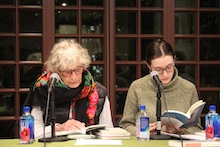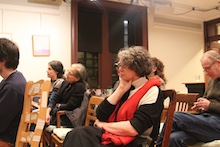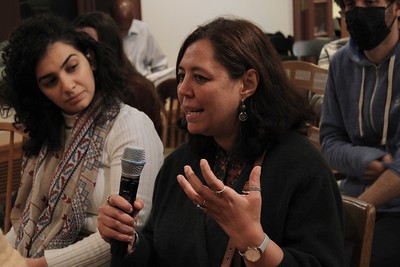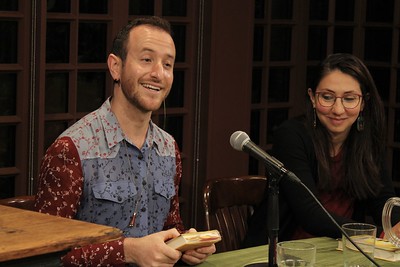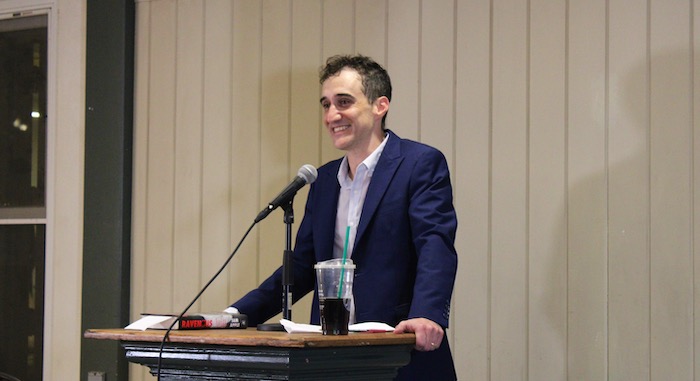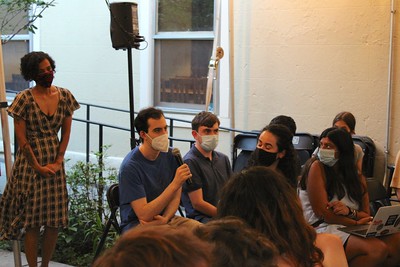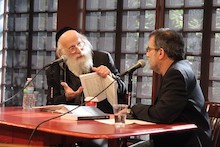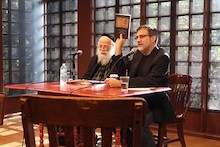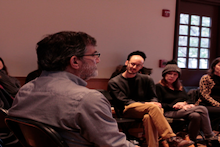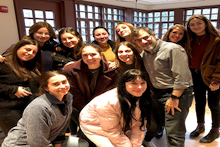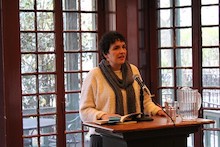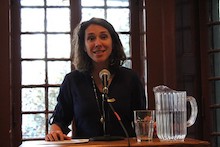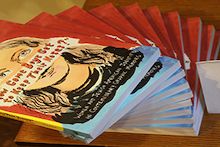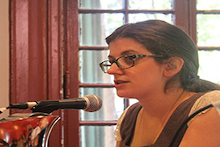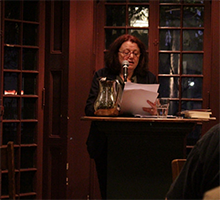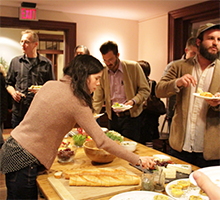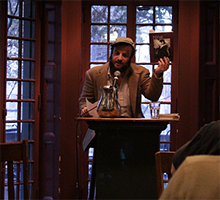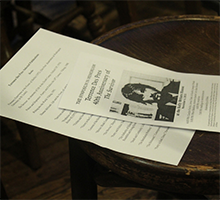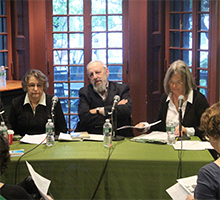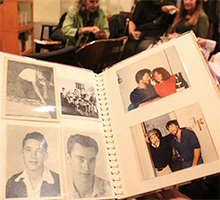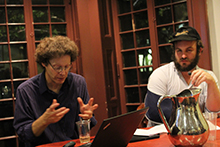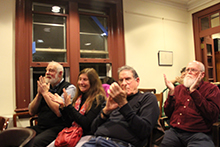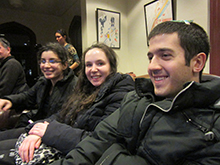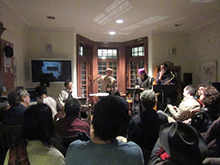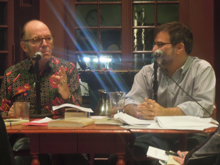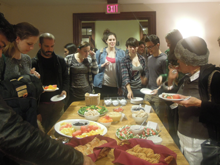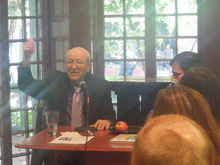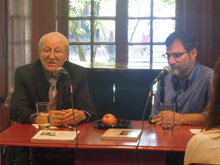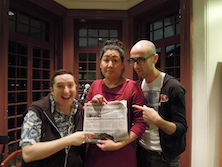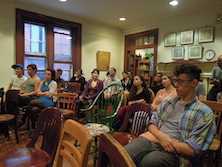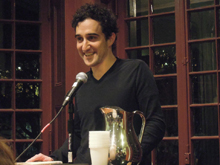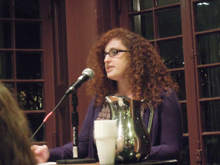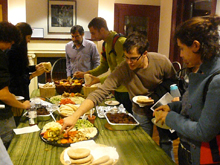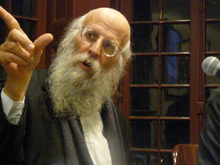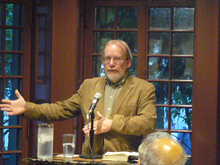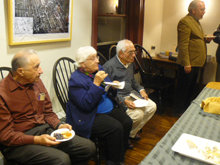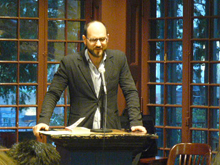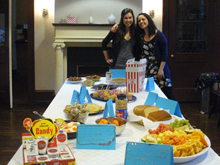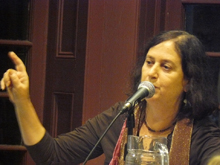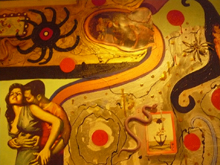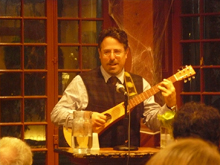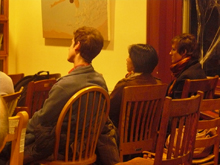Wexler Family Series
November 14, 2023: European-Jewish Poets, Past and Present: New Translations
Alex Braslavsky is a scholar, translator, and poet. A graduate student in the Harvard Slavic Department, she writes scholarship on Russian, Polish, and Czech poetry through a comparative poetics lens. She was an American Literary Translators’ Association Mentee in 2021. Her work on Polish literature has been supported by the Jurzykowski Polish Grant and the ©POLAND Translation Program. Her poetry has appeared in Conjunctions and Colorado Review, among others. Braslavsky is the translator of On Centaurs & Other Poems (World Poetry, 2023), the Polish modernist Zuzanna Ginczanka's first selected poetry volume to be published in English.
Mireille Gansel has won major awards for both her translations of German and Vietnamese poets, and for some of her seven books of poetry. Her lyrical memoir, Translation as Transhumance — published in an English translation by Ros Schwartz — has contributed significantly to the field of translation studies. She received the Veu Lliure 2021 Prize from the Catalan PEN. In 2018, Mireille became the Laureate of the Great Prize of Translation Etienne Dolet-Sorbonne Université. Other awards include the Khoury-Ghata poetry prize, the Gérald de Nerval translation prize, an English PEN Award, and a French Voices Award. Gansel's first book of poetry in English translation, Soul House (translated by Joan Seliger Sidney), will be published by World Poetry in November 2023.
Joan Seliger Sidney’s books of poetry include Body of Diminishing Motion, Bereft and Blessed, and The Way the Past Comes Back. Her translations, poems, and essays have appeared or are forthcoming in many literary journals and anthologies, including The Common and Asymptote, and have been nominated for Pushcart Prizes. She is Writer-in-Residence at University of Connecticut’s Center for Judaic Studies and has received several fellowships from the Connecticut Commission on the Arts, the Vermont Studio Center, and a Visiting Faculty Fellowship from Yale University. Her translation of Mireille Gansel's Soul House will be published by World Poetry in November 2023.
Zuzanna Ginczanka (1917-1945) was a Polish-Ukrainian-Jewish poet of the interwar period. Born in Kiev, which her parents fled to avoid the Russian Civil War in 1922, Ginczanka began writing seriously as a child in Równe, Poland (now Rivne, Ukraine). She was nationally recognized for her poetry by sixteen years of age. Encouraged by a correspondence with poet Julian Tuwim, she moved to Warsaw in 1935. There she became associated with the Skamander group and the satirical magazine Szpilki, and befriended many writers including Witold Gombrowicz. Her 1936 collection, On Centaurs, was widely lauded upon its release. At the start of World War II, she moved east, living in Równe and Soviet-occupied Lviv. In 1942, after the German takeover of Ukraine, she escaped arrest and fled to Kraków on false papers to join her husband. She was arrested in 1944 and shot by the Gestapo a few days before Kraków was liberated by the Soviets. After the war, her last known poem “Non omnis moriar…” was used in court to testify against her denouncers.
October 22, 2022: Moriel Rothman-Zecher
- watch: a video recording of this program via our YouTube channel
Moriel Rothman-Zecher is a Jerusalem-born novelist and poet. His first novel, Sadness Is a White Bird, was a finalist for the Dayton Literary Peace Prize and the National Jewish Book Award, the winner of the Ohioana Book Award, and longlisted for the Center for Fiction's First Novel Prize. Moriel's poetry and essays have been published in Barrelhouse, Colorado Review, The Common, The New York Times, The Paris Review's Daily, and ZYZZYVA, and he is the recipient of the National Book Foundation's '5 Under 35' Honor, two MacDowell Fellowships, and Yiddishkayt's Wallis Annenberg Helix Fellowship. His second novel, Before All the World, will be published by Farrar, Straus and Giroux on October 11th, 2022.
September 14, 2021: Sam Apple
- watch: a video recording of this program via our YouTube channel
In Ravenous, Sam Apple reclaims Otto Warburg as a forgotten, morally compromised genius who pursued cancer single-mindedly even as Europe disintegrated around him. While the vast majority of Jewish scientists fled Germany in the anxious years leading up to World War II, Warburg remained in Berlin, working under the watchful eye of the dictatorship. With the Nazis goose-stepping their way across Europe, systematically rounding up and murdering millions of Jews, Warburg awoke each morning in an elegant, antiques-filled home and rode horses with his partner, Jacob Heiss, before delving into his research at the Kaiser Wilhelm Society.
Hitler and other Nazi leaders, Apple shows, were deeply troubled by skyrocketing cancer rates across the Western world, viewing cancer as an existential threat akin to Judaism or homosexuality. Ironically, they viewed Warburg as Germany's best chance of survival. Setting Warburg's work against an absorbing history of cancer science, Apple follows him as he arrives at his central belief that cancer is a problem of metabolism. Though Warburg's metabolic approach to cancer was considered groundbreaking, his work was soon eclipsed in the early postwar era, after the discovery of the structure of DNA set off a search for the genetic origins of cancer.
Remarkably, Warburg's theory has undergone a resurgence in our own time, as scientists have begun to investigate the dangers of sugar and the link between obesity and cancer, finding that the way we eat can influence how cancer cells take up nutrients and grow. Rooting his revelations in extensive archival research as well as dozens of interviews with today's leading cancer authorities, Apple demonstrates how Warburg's mid-century work may well hold the secret to why cancer became so common in the modern world and how we can reverse the trend. A tale of scientific discovery, personal peril, and the race to end a disastrous disease, Ravenous would be the stuff of the most inventive fiction were it not, in fact, true.
Sam Apple teaches creative writing at the University of Pennsylvania and is on the faculty of the MA in Science Writing and MA in Writing programs at Johns Hopkins. Apple has published shorts stories, personal essays, satires, and journalistic features on a wide range of topics. In recent years, he has primarily written about science and health. His work has appeared in The New York Times Magazine, The Atlantic, Wired, McSweeney's, and NewYorker.com, among many other publications. Apple's first book, Schlepping Through the Alps, was a finalist for the PEN America Award for a first work of nonfiction. His most recent book is Ravenous.
April 21, 2021: MARIA KUZNETSOVA AND THE CHEBURASHKA COLLECTIVE
Maria Kuznetsova read from her new novel, Something Unbelievable (Penguin Random House, April 2021). In this sharp, heartfelt novel, an overwhelmed new mom asks to hear her grandmother’s story of her family’s desperate escape from the Nazis, discovering unexpected parallels to her own life in America. Additional readings by members of the Cheburashka Collective and an interactive discussion will follow.
Maria Kuznetsova was born in Kiev, Ukraine and moved to the United States as a child. She received an MFA in Creative Writing from the Iowa Writers' Workshop. Her debut novel, Oksana, Behave! was published by Spiegel & Grau/Random House in 2019 and was a Barnes & Noble Discover Pick as well as a best spring read according to Oprah Magazine, InStyle, Pop Sugar, and The Wall Street Journal. Her fiction and non-fiction appears or is forthcoming in McSweeney's Quarterly Concern, The Southern Review, Guernica, The Threepenny Review, Crazyhorse, Slate Magazine, and elsewhere. She lives in Auburn, Alabama with her husband and daughter, where she is an Assistant Professor of Creative Writing at Auburn University. Her second novel, Something Unbelievable, will be published by Random House in April of 2021. She is also a fiction editor at The Bare Life Review, a journal of immigrant and refugee literature. Follow Maria at @mashawrites.
November 19, 2019: Alan Rosen
- watch: a video recording of this program via our YouTube channel
Dr. Avraham (Alan) Rosen is the author or editor of fourteen books. He is most recently the author of The Holocaust’s Jewish Calendars: Keeping Time Sacred, Making Time Holy (Bloomington: Indiana UP, 2018); The Wonder of Their Voices: The 1946 Holocaust Interviews of David Boder (Oxford UP, 2010; updated paper edition 2012), and Sounds of Defiance: The Holocaust, Multilingualism and the Problem of English (U of Nebraska P, paper 2008); and the editor of Elie Wiesel: Jewish, Literary, and Moral Perspectives (Indiana UP, 2013, finalist, National Jewish Book Awards) and Literature of the Holocaust (Cambridge UP, 2013, also a finalist, National Jewish Book Award). His current writing, including two books and a number of articles, focuses largely on the legacy of his teacher and mentor, Elie Wiesel.
November 9, 2018: Kristallnacht: 80 Years Later
Holocaust testimony is typically associated with the oldest among us. This program asks us to do something counterintuitive: to listen to young people and hear—and respond to—how they find or at least seek hope amid tragedy. Let's take some time to discuss how the youngest generations are affected by the atrocities of the Holocaust by listening as they bespeak their relationship to the events of the past. How have they have grown up encountering the responsibility (or "response"-ability) to keep intact the long chain of witness. During this intergenerational conversation, we invite our elders to listen to young people as they learn how to connect with their ancestors' history.
April 19, 2018: Jehanne Dubrow
- watch: a video recording of this event via KWH-TV: part 1, part 2
- listen to an audio recording of this event
Jehanne Dubrow's first full-length collection, The Hardship Post, explores what it means to bear witness to atrocity endured by ones ancestors, addressing the Holocaust from the present moment and insisting on the need to keep returning to its unresolved past. Join us for a conversation with Dubrow about what it means to continue writing and teaching the Holocaust within the context of the current political climate, lead by Penn poet and scholar Julia Kolchinsky Dasbach.
Jehanne Dubrow (http://jehannedubrow.com/) is the author of six books of poetry, including most recently Dots & Dashes, winner of the Crab Orchard Series in Poetry Open Competition Award (Southern Illinois University Press, 2017). Her previous books are The Arranged Marriage (University of New Mexico Press, 2015), Red Army Red (Northwestern University Press, 2012), Stateside (Northwestern University Press, 2010), From the Fever-World (WWPH, 2010), and The Hardship Post (three candles press, 2009, Sundress Publications, 2013). She has co-edited two anthologies, The Book of Scented Things: 100 Contemporary Poems about Perfume (Literary House Press, 2016) and Still Life with Poem: Contemporary Natures Mortes in Verse (Literary House Press, 2014). Her first book of creative nonfiction, throughsmoke: an essay in notes, will be published by New Rivers Press in 2019.
Her poetry, nonfiction, and book reviews have appeared in Southern Review, Pleiades, The New York Times Magazine, Southwest Review, The New England Review, as well as on Poetry Daily, Verse Daily, and American Life in Poetry. She earned a B.A. in the “Great Books” from St. John's College, an MFA from the University of Maryland, and a PhD from the University of Nebraska-Lincoln. She has been a recipient of the Alice Fay Di Castagnola Award, the Towson University Prize for Literature, an Individual Artist's Award from the Maryland State Arts Council, a Walter E. Dakin Fellowship and a Howard Nemerov from the Sewanee Writers' Conference, and a Sosland Foundation Fellowship from the Center for Advanced Holocaust Studies.
The daughter of American diplomats, Jehanne was born in Italy and grew up in Yugoslavia, Zaire, Poland, Belgium, Austria, and the United States. She is an Associate Professor of creative writing at the University of North Texas.
April 18, 2018: Jehanne Dubrow
- watch: a video recording of this event via KWH-TV: part 1, part 2
- listen to an audio recording of this event
Jehanne Dubrow (http://jehannedubrow.com/) is the author of six books of poetry, including most recently Dots & Dashes, winner of the Crab Orchard Series in Poetry Open Competition Award (Southern Illinois University Press, 2017). Her previous books are The Arranged Marriage (University of New Mexico Press, 2015), Red Army Red (Northwestern University Press, 2012), Stateside (Northwestern University Press, 2010), From the Fever-World (WWPH, 2010), and The Hardship Post (three candles press, 2009, Sundress Publications, 2013). She has co-edited two anthologies, The Book of Scented Things: 100 Contemporary Poems about Perfume (Literary House Press, 2016) and Still Life with Poem: Contemporary Natures Mortes in Verse (Literary House Press, 2014). Her first book of creative nonfiction, throughsmoke: an essay in notes, will be published by New Rivers Press in 2019.
Her poetry, nonfiction, and book reviews have appeared in Southern Review, Pleiades, The New York Times Magazine, Southwest Review, The New England Review, as well as on Poetry Daily, Verse Daily, and American Life in Poetry. She earned a B.A. in the “Great Books” from St. John's College, an MFA from the University of Maryland, and a PhD from the University of Nebraska-Lincoln. She has been a recipient of the Alice Fay Di Castagnola Award, the Towson University Prize for Literature, an Individual Artist's Award from the Maryland State Arts Council, a Walter E. Dakin Fellowship and a Howard Nemerov from the Sewanee Writers' Conference, and a Sosland Foundation Fellowship from the Center for Advanced Holocaust Studies.
About Dots & Dashes: “With Dots & Dashes, Jehanne Dubrow adds a sixth volume to our bookshelves of necessary poetry, and we are given a panoramic view of the landscape of marriage within the structure and confines of military life. This is a difficult and layered collection, one that refuses to avert its gaze from trouble in all its overt and nuanced forms. While these poems offer lenses into the interiority of an often closed-off world, the core experiences within these poems don't reside on military bases and in military life alone. Isolation, separation, the silences and failures of communication—Dots & Dashes is a series of messages called out over the waters of a life, a reminder that sailors are not always the ones who are lost at sea.” —Brian Turner
November 9, 2017: LUNCH WITH BETH KISSILEFF
Beth Kissileff holds a PhD in comparative literature and literary theory from Penn and has taught at Carleton, the University of Minnesota, Smith and Mount Holyoke. Her novel Questioning Return was started when she finished her dissertation and decided to write the novel she had always wanted to. Of course, the novel turned out to be about... a graduate student writing her dissertation! Kissileff currently works as a freelance journalist; she has also edited and contributed to Reading Genesis a collection of essays by academics on the first book of the Bible. Her short story collection I'm Not Here for Myself is under review for publication and she is at work on a second novel. She is a third generation Penn graduate.
November 7, 2017: ON ELIE WIESEL: ALAN ROSEN AND AL FILREIS IN CONVERSATION
Dr. Avraham (Alan) Rosen is the author or editor of twelve books. He is most recently the author of The Wonder of Their Voices: The 1946 Holocaust Interviews of David Boder (Oxford UP, 2010; updated paper edition 2012), and Sounds of Defiance: The Holocaust, Multilingualism and the Problem of English (U of Nebraska P, paper 2008); and the editor of Elie Wiesel: Jewish, Literary, and Moral Perspectives (Indiana UP, 2013, finalist, National Jewish Book Awards) and Literature of the Holocaust (Cambridge UP, 2013, also a finalist, National Jewish Book Award). His new book, Keeping Time Sacred, Making Time Holy: The Holocaust's Jewish Calendars, is due to appear in the coming months. His current writing, including two books and a number of articles, focuses largely on the legacy of his teacher and mentor, Elie Wiesel. He was a research fellow of the Fondation pour la Mémoire de la Shoah from 2006-2009. He has also held fellowships at the Center for Advanced Holocaust Studies, the United States Holocaust Memorial Museum; the International Institute for Holocaust Research, Yad Vashem; the Katz Center for Advanced Jewish Studies, University of Pennsylvania, and the Archives for the History of American Psychology, University of Akron. In 2013, he served as the Wilkenfeld Scholar in Holocaust Education in Sydney, Australia. He has taught at universities and colleges in Israel and the United States, and lectures regularly on Holocaust Literature at Yad Vashem's International School for Holocaust Studies and other Holocaust study centers. Recent lecture venues include Yale University, the University of Pennsylvania, and a keynote address at a Leeds University conference on "Jewish Exile and the Arts." In Fall, 2017, he is scheduled to receive the Susan Herman Award for Leadership in Holocaust and Genocide Awareness from Kean State University.
Born and raised in Los Angeles, educated in Boston under the direction of Elie Wiesel, he lives in Jerusalem with his wife and four children.
October 31, 2016: LUNCH WITH TAHNEER OKSMAN
Focusing on the visionary work of seven contemporary female Jewish cartoonists, Tahneer Oksman in her book How Come Boys Get to Keep Their Noses draws a remarkable connection between innovations in modes of graphic storytelling and the unstable, contradictory, and ambiguous figurations of the Jewish self in the postmodern era. American comics reflect the distinct sensibilities and experiences of the Jewish American men who played an outsized role in creating them, but what about the contributions of Jewish women?
TAHNEER OKSMAN is Assistant Professor and Director of the Academic Writing Program at Marymount Manhattan College. In addition to her recent book on Jewish women and comics, Oksman has written on visual culture, women's literature, and Jewish identity for academic publications such as a/b: Auto/Biography Studies, Studies in American Jewish Literature, and Studies in Comics. She also writes reviews and essays for publications and sites including the Forward, Lilith, Jewish Book Council, the Los Angeles Review of Books, BookTrib, and Cleaver, where she is graphic narratives reviews editor.
March 15, 2016: Multilingual Poetics: Anne Tardos
- watch: a video recording of this event via KWH-TV
- listen to an audio recording of this event
Anne Tardos, French-born American poet, is the author of nine books of poetry and several multimedia performance works. Among her recent books of poetry are NINE (BlazeVOX, 2015); Both Poems (Roof, 2011); I Am You (Salt, 2008); and The Dik-dik's Solitude (Granary, 2003). She is the editor of Jackson Mac Low's The Complete Light Poems (Chax, 2015); 154 Forties (Counterpath, 2012); and Thing of Beauty (California, 2008). A Fellow in Poetry from the New York Foundation for the Arts, Tardos lives in New York.
November 10, 2015: LESLIE GILBERT-LURIE AND AL FILREIS IN CONVERSATION
Leslie Gilbert-Lurie is a writer, lawyer, and philanthropist, whose highly acclaimed memoir, Bending Toward the Sun, was published in 2009. In addition to co-chairing both L.A. County’s Blue Ribbon Commission on Child Welfare’s Transition Team and Human Rights Watch’s California Committee South, Leslie recently served as Vice Chair of the Los Angeles County Blue Ribbon Commission on Child Welfare. Gilbert-Lurie also is a founding member and past president of the Alliance for Children’s Rights, and for fourteen years she also served as a board member and three-time past President of the Los Angeles County Board of Education. Leslie also is a member of Facing History and Ourselves, The Skirball Cultural Center, and the Johns Hopkins School of Education. Leslie spent a decade as an executive at NBC, during which she oversaw NBC Productions and the Comedy division, co-wrote television episodes, and co-founded an in-house production company, Lurie-Horwits productions. As a lawyer, Leslie worked at the law firm of Manatt, Phelps, Rothenberg and Tunney and served as a Ninth Circuit Court of Appeals Law Clerk. While at UCLA, she was the Student Regent, on the Board of Regents of the University of California.
about Bending Toward the Sun:
"This book is heartbreaking yet inspiring, a story told by three generations – the grandmother, who is a child survivor, the mother, a successful American professional, and the daughter, full of talent, promise and hope. At its core, this book is a study of how the Holocaust experience wraps itself around each woman – creating extreme fear of separation, setting off depression, filling mind and memory with haunting evil and indefinable ghosts. Yet it also tells us of hard won wisdom for living distilled from pain and loss, of life force driven by the will to overcome suffering, of Jewishness lost and Jewishness reborn, of unquenchable love – all passed on and shared between the generations through the filter of the Holocaust. Gripping, exhausting, exciting, devastating – this book is at times hard to read but always impossible to put down."
-- Rabbi Irving Greenberg
Founding President, Jewish Life Network; former Chairman of United States Holocaust Memorial Museum
November 4, 2015: The Symposium in Memoriam Terrence Des Pres
The symposium in memoriam Terrence Des Pres at the Kelly Writers House will celebrate the 40th anniversary of the publication of his influential study of survivorship and writing (bearing witness), The Survivor: An Anatomy of Life in the Death Camps (1976), a major work on Holocaust testimony. Much contemporary scholarly and journalistic work about the impact of genocide on survivors owes a debt to Des Pres and The Survivor. The Survivor was among the first systematic studies – from the point of view of literary theory, literary history and writing – of the writing and other forms of expression of genocide victims and intended victims.
Featured presenters include Peter Balakian, a poet and scholar who has written extensively about the Armenian genocide; Penn professor Al Filreis, who has taught a course on literary representations of the Holocaust for more than three decades; Carolyn Forche, poet and editor of the groundbreaking 1993 anthology Against Forgetting: Twentieth-Century Poetry of Witness; Annette Insdorf, professor of film at Columbia and author of Indelible Shadows: Film and Holocaust, a landmark study in the subject; Rabbi Joseph Polak, an infant survivor of the Holocaust; Alan Rosen who has worked extensively with Holocaust testimonies over the course of his career; and Leona Toker, faculty member at the Hebrew University of Jerusalem, who has written extensively on survivorship.
October 28, 2015: MULTILINGUAL POETICS: PETER COLE
Peter Cole has been called “an inspired writer” (The Nation) and “one of the most vital poets of his generation (Harold Bloom). He is the author of four books of poetry, most recently The Invention of Influence and Things on Which I've Stumbled. Cole's many translations from Hebrew and Arabic include The Poetry of Kabbalah: Mystical Verse from the Jewish Tradition and The Dream of the Poem: Hebrew Poetry from Muslim and Christian Spain, c. 950-1492, which received the National Jewish Book Award and the American Publishers Association's Award for Book of the Year. He has also translated So What: New & Selected Poems, 1971-2005 by Taha Muhammad Ali and three volumes by Israeli poet Aharon Shabtai, including War & Love, Love & War. He has received numerous honors for his work, including a Guggenheim Foundation fellowship, an American Academy of Arts and Letters Award in Literature, the PEN Translation Prize, and, in 2007, he was named a MacArthur fellow. Born in Paterson, New Jersey, Cole now divides his time between Jerusalem and New Haven.
January 20, 2015: JAKE MARMER'S HERMENEUTIC STOMP
- watch: a video recording of this event via KWH-TV
- listen: to an audio recording of this event
Joining poet and performer Jake Marmer for an unforgettable performance will be jazz-klez luminaries Frank London on trumpet, Greg Wall on sax, Uri Sharlin on keys, and Eyal Maoz on guitar.
Jake Marmer is a poet and performer. His first record, “Hermeneutic Stomp” (Blue Thread Music, 2013) has featured jazz-klez luminaries Frank London, Greg Wall, Eyal Maoz, and Uri Sharlin, and brought together diverse poetic traditions, jazz, klezmer, new and ancient improvisation techniques. It was hailed as a “soulful narrative line in counterpoint to… language-drunk abstractions” (The Jewish Week), “experience of mystic pleasures… freshly contemporary” (Shofar), and a “thought provoking debut” (All About Jazz). His poetry collection, Jazz Talmud was published by Sheep Meadow Press in 2012. Currently a doctoral candidate at the CUNY Graduate Center, he lives in Palo Alto with his wife and two children. He frequently contributes to the Forward and Tablet Magazine, and is a co-founder of North America’s first Jewish Poetry retreat at KlezKanada Festival. For more information, see http://jakemarmer.wordpress.com.
Grammy-winning Trumpeter/composer Frank London is the founding member of the Klezmatics, Hasidic New Wave, and has performed with John Zorn, LL Cool J, Mel Torme, Lester Bowie's Brass Fantasy, LaMonte Young, They Might Be Giants, David Byrne, Jane Siberry, Ben Folds 5, Mark Ribot, Maurice El Medioni and Gal Costa, and is featured on over 100 cds. His own recordings include Invocations (cantorial music); Frank Londonπs Klezmer Brass Allstarsπ Di Shikere Kapelye and Brotherhood of Brass; Nigunim and The Zmiros Project (Jewish mystical songs, with Klezmatics vocalist Lorin Sklamberg); The Debt (film and theater music); The Shekhina Big Band; the soundtrack to The Shvitz; the soundtrack to Perl Gluck's The Divahn and four releases with the Hasidic New Wave.
Greg Wall is a world-class saxophone and clarinet player, as well as a congregational rabbi. He has performed and recorded with Hasidic New Wave, Greg Wall Trio, The Wall/London Band, Neshama Carlebach, the Hi-Tops, Greg Wall's Unity Orchestra, and has made many session appearances for record dates and film scores.
Based in New York City, the Israeli born Eyal Maoz is a sought after composer, guitarist, and bandleader. He’s a Tzadik, Ayler, Out Now and Piadrum Records artist and a member of John Zorn’s Cobra and Abraxas ensembles. Eyal leads his own bands including Edom (Tzadik Records), 9 Volt with Tim Berne, the Maoz-Sirkis Duet, Hypercolor, and the Maoz-Masaoka Duet (with koto player Miya Masaoka).
Composer, accordionist and pianist Uri Sharlin performed collaborations with prominent artists among which are Antony and the Johnsons, Natalie Merchant, Rosy da Palma, Andres Levin, Avi Avital, Frank London, and Flight of the Conchords. Throughout his career, Uri has been strongly influenced by diverse musical genres. In his albums, Uri's jazz and classical background fuses with balkan Rhythms, Arabic modes and Brazilian harmonies. He is currently leading several groups in including the Cardamon Quartet and the DogCat Ensemble.
December 3, 2013: The Holocaust Experience in the Poetry of Paul Celan
- watch: a video recording of this event via KWH-TV
- listen: to an audio recording of this
event
Born in Strasbourg, France, Pierre Joris is a poet, translator and essayist.
Pierre Joris is the author of over 40 books. As one of the foremost translators of avant-garde poetry into both French and English, he frequently explores the lesser-known works of both major and obscure experimental poets. His translations include Exile is My Trade: A Habib Tengour Reader (Black Widow Press, 2012); Paul Celan: Selections (University of California Press, 2005); 4X1: Works by Tristan Tzara, Rainer Maria Rilke, Jean-Pierre Duprey, and Habib Tengour (Inconundrum Press, 2003); and Pppppp: Kurt Schwitters Poems, Performance, Pieces, Proses, Plays, Poetics (Temple University Press, 1994). Of his translations of Paul Celan, poet Michael Palmer said: "Joris has dwelled during the better part of his life in Celan's words and silences…he has journeyed through the work's intricacies like very few others."
Joris's own poetry, published extensively in chapbooks abroad, has been collected in two volumes, Poasis: Selected Poems 1986-1999 (Wesleyan University Press, 2001), and Breccia: Selected Poems 1972-1986 (Station Hill PR, 1987). He is also a celebrated essayist and editor. In the essay collection A Nomadic Poetics (Wesleyan, 2003), he explores the successes and failings of the avant-garde movement, a subject he surveyed in a two-volume anthology of 20th century avant-garde writings, Poems for the Millennium (University of California Press, 1998), co-edited with Jerome Rothenberg.
He collaborates frequently through dance, multimedia, and music with his wife, the performance artist Nicole Peyrafitte. Twice the recipient of PEN Awards for Translation, he was also the 2003 Berlin Prize fellow at the American Academy in Berlin.
Joris currently lives in New York, where he teaches poetry and poetics at the State University of New York, Albany.
October 15, 2013: Lunch With Holocaust Survivor Irving Roth
- watch: a video recording of this event via KWH-TV
- listen to an audio recording of this event
- watch: a video recording of this event via KWH-TV
- listen to an audio recording of this event
Irving Roth was born in Kosice, Czechoslovakia on September 2, 1929. He is a survivor of the Nazi death camps Auschwitz and Buchenwald, and he dedicates his life to Holocaust education. Mr. Roth is the Director of the Holocaust Resource Center – Temple Judea of Manhasset and an Adjunct Professor at the University of Maine. He is a recognized speaker on anti-Semitism and the Holocaust and is a frequent lecturer at colleges and universities in the United States, Canada and Europe. As a Holocaust survivor, he provides personal testimony on his experiences during WWII. He is the recipient of numerous awards for his work in Holocaust education and community service, including the Spirit of Anne Frank Outstanding Citizen Award from the Anne Frank Center USA for his brainchild, the Adopt a Survivor program. The program, which puts teens in touch with Holocaust survivors, has been instituted nationally and internationally in public and parochial high schools and colleges. He has written two books one of which, entitled Bondi's Brother, tells the story of his personal experiences before, during, and after the war.
Mr. Roth received a BS and MS in Electrical Engineering from Polytechnic Institute of Brooklyn and currently resides in Nassau County, NY.
September 11, 2012: New Queer Jewish Writing: Dan Fishback and Ezra Berkley Nepon
- watch: a video recording of this event via KWH-TV
- listen to an audio recording of this event
- watch: a video recording of this event via KWH-TV
- listen to an audio recording of this event
Dan Fishback (C'03) is the 2012-2013 ArtsEdge Resident at the University of Pennsylvania. He has been writing and performing in New York City since 2003. Major works include The Material World (2012), thirtynothing (2011) and You Will Experience Silence (2009), all directed by Stephen Brackett at Dixon Place. Fishback has received grants from the Franklin Furnace Fund (2010) and the Six Points Fellowship for Emerging Jewish Artists (2007-2009). He is a resident artist at the Hemispheric Institute for Performance & Politics at NYU (2012), and has enjoyed previous residencies at BAX/Brooklyn Arts Exchange (2010-2012), Yaddo and the MacDowell Colony. Previous works include No Direction Homo (P.S. 122, 2006), Please Let Me Love You (Dixon Place, 2006), Waiting for Barbara (Galapagos Art Space, 2006), boi with an i (Collective: Unconscious, 2004), and Assholes Speak Louder Than Words (Sidewalk Cafe, 2004). Also a performing songwriter, Fishback began his music career in the East Village's anti-folk scene. His band, Cheese On Bread, has toured Europe and North America in support of their two full-length albums, "Maybe Maybe Maybe Baby" (2004) and "The Search for Colonel Mustard" (2007), the latter of which was re-issued in Japan in 2010 on Moor Works Records. As a solo artist, Fishback has released several recordings, including "Sweet Chastity" (2005, produced by César Alvarez of The Lisps), and his latest, "The Mammal Years" (2012). He was a member of the movement troupe Underthrust, which collaborated with songwriter Kimya Dawson on several performances and videos. Fishback's essay, "Times Are Changing, Reb Tevye," was featured in the anthology "Mentsh: On Being Jewish & Queer" (Alyson Books, 2004). His visual installation, "Pen Pals," was featured in the 2011 Soho exhibition of the Pop-Up Museum of Queer History, for which he later served on the Selection Committee. Fishback frequently teaches workshops on performance composition and queer performance culture. He blogs at thematerialworld.tumblr.com; his regular website is www.danfishback.com. Before graduating from the University of Pennsylvania in 2003, Fishback wrote a weekly column for the Daily Pennsylvanian, was heavily involved in anti-war activism, and organized events at Kelly Writers House.
Ezra Berkley Nepon is a West Philadelphian writer, performer, and organizer. Nepon recently returned from an East and West Coast tour with her new book Justice, Justice Shall You Pursue: A History of New Jewish Agenda, published by Thread Makes Blanket Press and distributed by AK Press. Other creations include the full-length play Between Two Worlds: Who Loved You Before You Were Mine which used themes from The Dybbuk to think about relationships between queer generations in the wake of the AIDS epidemic ("a love letter to the ghosts among us"), and Little Orphan Gender Revolutionary Annie – a 4-act song-cycle about the gender binary oppression of the girls' orphanage, told through toy theater/green screen magic. Nepon is pursuing an MA in Goddard College's Transformative Language Arts Program, and working on a thesis about New Yiddish Theater-maker Jenny Romaine and radical faerie theater-troupe The Eggplant Faerie Players. Visit: www.ezraberkleynepon.wordpress.com.
February 9, 2012:
Jewish Writers You Wish You Knew About
- watch: a video recording
of this event via KWH-TV
- listen: to a audio recording of this event
- watch: a video recording of this event via KWH-TV
- listen: to a audio recording of this event
CURF Summer Intern Alexa Bryn put together a program of seven students and faculty members, who each discussed a Jewish writer you've probably never heard of that they think you should know more about. Andrew Zitcer, Adriel Koschitzsky, Sam Apple, Sarah Gracombe, Al Filreis, Kate Herzlin and Max Apple each had approximately seven minutes to speak. Each of these presenters gave background on their respective writers, and then shared some of their work with the audience. Topics and reactions spanned across a wide spectrum, from audience members singing along to Avrom Goldfaden's lullaby "Rozhinkes Mit Mandlen" to Al Filreis giving a heartfelt analysis of Primo Levi's The Periodic Table, a core book in his Holocaust class and one of his favorite books of all time. Such an inspiring evening of Jewish writers could only be rivaled by the reception, which featured a spread of some favorite Jewish foods!
November 7, 2011: Alan Rosen
- watch: a video recording
of this event via KWH-TV
- listen: to a audio recording of this event
What does it mean to say, "I did not interview the dead?" What do you gain or lose in listening to an audio recording of a holocaust testimony, versus watching a video and listening at the same time? Eminent Holocaust scholar Alan Rosen came to the Writers House and posed these difficult questions, inspired by the work of David Boder, to the audience. Boder was one of the first people to conduct and record interviews with survivors, and is the subject of much of Rosen's research. He shared some of these audio recordings – made immediately in the years following World War II – with the audience, as can be heard in this video. Rosen provided respectful and thought-provoking commentary on Boder's intentions and discoveries throughout the process of conducting the interviews. Both the insightful conversation between Alan Rosen and moderator Al Filreis and the challenging discussions with the audience made this an important, emotional event not to be missed.
October 3, 2011: Peter Filkins
- watch: a video recording
of this event via KWH-TV
- listen: to a audio recording of this event
Peter Filkins, award-winning poet and translator, visited the Writers House to speak about the literature and experiences of H.G. Adler, whose work Filkins has translated. Adler, a Holocaust survivor, wrote Panorama, a novel in which the protagonist, Joseph, traverses similar obstacles to those Adler faced. Filkins discussed his belief that Adler was one of the first to write about the sociological effects of the Holocaust. In his discussions, Filkins shared his extensive knowledge of Adler's childhood, family, and life during, before and after his time in concentration camps. Filkins also talked about Adler's desire to bear witness to the events in his own writing, and to make his characters more than just victims. When asked about the challenges of translating Adler's works from German to English, Filkins answered honestly and thoughtfully. As he so eloquently put it, "translation is an art of compromise."
April 21, 2011: Sam Munson
- watch: a video recording of this event via KWH-TV
- listen: to a audio recording of this event
Fiction writer Sam Munson joined us for a reading of his novel, The November Criminals, a story of a high school drug dealer who investigates the troubling, mysterious murder of his classmate, Kevin Broadus. The reading from his novel explored risky topics of race, public schools and their rituals, mourning practices, marijuana, and to the audience's amusement, the necessity of sex. As we learned in a witty introduction by Michelle Taransky, Munson's novel is set to be made into a movie; audience members had the opportunity to ask questions about this and other topics generated from his reading. Following this discussion was a creative food reception with references to the novels' cigarettes (candy cigarettes available to munch on), fried chicken (bucket and all provided), and eggs (served as gummy candy).
April 14, 2011: A Conversation with Ruth Gruber
- watch: a video recording of this program via KWH-TV
- listen: to an audio recording of this event
Ruth Gruber is an award-winning Jewish American journalist, photographer, and humanitarian. She was born in Brooklyn in 1911 and is the author of nineteen books, including the National Jewish Book Award-winning biography Raquela (1978) and Witness (2007), a chronicle of her 80-year career as a correspondent and photojournalist, during which time she covered such events as the rise of Nazi Germany. She is the subject of a new documentary, Ahead of Time, which premiered last fall.
February 24, 2011: Shahar Bram, Jessica Greenbaum, Bob Perelman, and Rivka Fogel
Shahar Bram is a poet, scholar, and translator. He teaches Hebrew & Comparative Literature at the University of Haifa, specializing in theory and American literature. He is the author of The Ambassadors of Death: The Sister Arts, Western Canon and the Silent Lines of a Hebrew Survivor (translated by Batya Stein), A Backward Look: The Long Poem in the Writings of Israel Pincas, Harold Schimmel and Aharon Shabtay (The Hebrew University Magnes Press, 2005), and Charles Olson and Alfred North Whitehead: An Essay on Poetry (translated by Batya Stein, Bucknell University Press, 2004), among other works. His books of poetry include: Walls (Nahar Books, 2008), The Blooming of Memory (Am-Oved, 2005) and City of Love (Carmel Publishers, 1999). His essays, articles and translations have been published in literary journals such as Word & Image, Partial Answers, Connotations, and Salamander.
Jessica Greenbaum was born in Brooklyn where she lives, finally. A graduate of Barnard College and an initiating graduate of the University of Houston's Writing Program, she has worked as a business reporter for Forbes Magazine, a researcher for The Anti-Defamation League's Civil Rights Division, an English Dept adjunct, and as an editor for a magazine-on-tape for people who are visually impaired. She is presently the chief domestic scientist for a family of husband and two teenage girls, and poetry editor of the Massachusetts based annual, upstreet. Her first book, Inventing Difficulty, won the Gerald Cable Prize, and poems from her second manuscript have appeared or are forthcoming in The New Yorker, Poetry, Harvard Review, Ploughshares, The Torah: A Woman's Commentary, CCAR Journal: A Reform Jewish Quarterly, Nextbook and . . . ZEEK. She is the founder of Foot Traffic Presents, which sells home-made muffins to passersby for charities benefiting girls and women in the third world (mostly), and which raised $1,500 in its first eleven weeks. Last year she was a runner-up to be Brooklyn's Poet Laureate, and that's a good thing because it sounds like it would have been the hardest of all her non-paying jobs to date.
Bob Perelman teaches at the University of Pennsylvania. He has published 19 books of poems, including: IFLIFE (2006, N.Y: Roof); Playing Bodies, in collaboration with painter Francie Shaw (2004, N.Y.: Granary); and Ten to One: Selected Poems (1999, Middletown, Conn.: Wesleyan University Press). His critical books are The Marginalization of Poetry: Language Writing and Literary History (1996, Princeton University) and The Trouble with Genius: Reading Pound, Joyce, Stein, and Zukofsky (1994, University of California). His work can be accessed on Penn Sound.
Rivka Fogel is finishing up her last semester at Penn, where she is the Behrman scholar at the Center for Programs in Contemporary Writing. Her work has been published in various journals including Peregrine and The Brighton Post, and has been featured in Institute of Contemporary Art publications and Arts in the City Crawl. She has poetry forthcoming in The Penn Review and in ZEEK, for which she is also a contributing editor. A past features writer for The Jewish Week, Rivka writes on contemporary art for Art Observed, and was the editor-in-chief of The Kedma Journal, Penn's journal on Israel and Jewish culture. She focuses much of her own research on religion in postwar language theory, and was awarded grants from the Penn English Department and the Center for Undergraduate Research and Fellowships to travel to Jerusalem, where she studied language theory in Orthodox Judaism. Her most recent project, LOL_face, is a web index of identity.
November 16, 2010: Susan Bee
- watch: a video recording of this event via KWH-TV
Artist, editor, and designer, Susan Bee, joined us for the Brodsky Gallery opening featuring her pieces. After an introduction by Trisha Low, Bee went on to discuss feminism and Judaism as themes throughout her work. A child of immigrant artists, some of Bee's art centers around her take on American culture, looking at it from what she describes as an "oblique angle". Her unique perspective on womens issues is clear as she simultaneously addresses and wrestles with both the culture surrounding women and expectations of the feminist community. She discussed her extensive work with poets; M/E/A/N/I/N/G, the journal she co-edited which featured writing by artists; and so much more on religion, audience and artist, and feminism in art. As Low says of Bee, her work is "strikingly vocal and always political".
November 1, 2010: Joseph Skibell
- watch a video recording of this event via KWH-TV
- listen: to an audio recording of this event
Novelist Joseph Skibell visited the Writers House to read from his newest novel, A Curable Romantic, which Max Apple, after providing some information on the plot, hailed as the following: "when you add irony, and comedy, and perfection of language, the result is a great novel". After this introduction from Apple, the National Endowment for the Arts Fellowship winner Skibell read from this newest of his three books. Skibell, the director of the Richard Ellmann Lectures in Modern Literature at Emory University, has filled the book with such strange and rich illusions as Freud, dybbuks, and Jewish mysticism. The audience was delighted to hear Skibell's own summary of his writing to the tune of a Gilbert and Sullivan patter song, complete with his own mini-guitar for accompaniment. Indeed, Joseph Skibell is the very model of a Modern Major Novelist.

